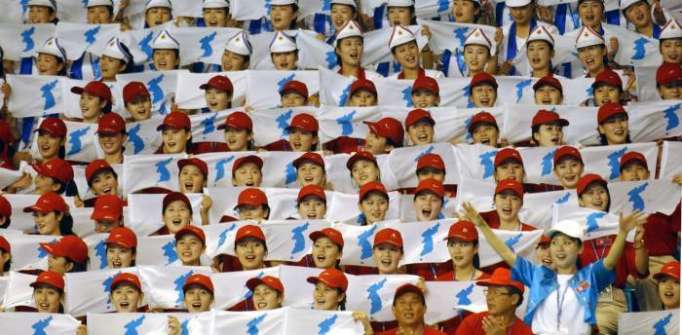Inter-Korean diplomacy isn’t about nuclear weapons. The cooler temperatures on North Korea come from inter-Korean diplomacy — not diplomacy that includes the United States or other major powers. President Moon Jae-in of South Korea calculated that it was more advisable to have North Korea participate in the Olympics than to let North Korean leader Kim Jong Un spoil things from the periphery, potentially testing missiles or nuclear weapons just 60 miles to the north. The two countries have discussed holding more formal talks after the Olympics are over, including a possible summit meeting.
However, inter-Korean diplomacy is primarily focused not on North Korea’s weapons programs but on issues specific to North and South Korea, like reuniting families divided by the Korean War. What’s more, while in South Korea, Pence insisted that the North Korean presence at the Olympics was a “charade,” called the regime “tyrannical” and urged that the pressure campaign against it continue, suggesting a very different approach.
Alliance trouble ahead. If Moon decides to pursue a North-South summit, he may further postpone annual military exercises with the United States, which have already been pushed back because of the Olympics. Pyongyang finds the exercises problematic, believing they’re U.S. preparation for a decapitation strike against the north.
From a military perspective, the annual drills could probably be delayed with no more than a modest impact on U.S.-South Korea readiness. But if Moon unilaterally decides to do so, it will ruffle U.S. feathers. (American officials would probably prefer to make this concession to North Korea jointly, in exchange for a diplomatic opportunity that involved both South Korea and the United States).
Kim Jong Un has done an excellent job of capitalizing on and exacerbating discord in the U.S.-South Korea alliance, trying to separate the allies. He would like to see the exercises downgraded for his own sake. And he can anticipate that a summit will sow more strife on its own — and will try to make sure of it. If the exercises do go ahead despite North Korea’s charm offensive, Kim will probably test something in response.
The U.S. negotiating position hasn’t changed. On his way home from the games, Pence said the United States was willing to talk to North Korea without preconditions. There has been no White House mention of the proposal since. But even if it is genuine, there is still an obvious impediment to talks: The United States continues to insist that North Korea must come to the negotiating table prepared to denuclearize. There is almost no chance that North Korea intends to give up its nuclear weapons, and therefore will not negotiate to this end. It might be willing to engage in diplomacy if it believed U.S. objectives were more modest, but if Washington continues to press disarmament publicly, Pyongyang is unlikely to believe a deal can be reached at all.
The U.S. objectives haven’t changed. Under the Trump administration, the U.S. has taken the position that North Korea should not be allowed to acquire an intercontinental ballistic missile capable of delivering a nuclear payload to the United States. Some senior officials have provided alternative takes on this red line, but the stance is basically unchanged: The administration wants to prevent a fully operational North Korean ICBM.
Unfortunately, the administration has few tools with which to achieve this. Diplomacy is unlikely to succeed in the short term for the reasons described above, and sanctions can’t wrest long-range missiles out of Kim’s hands.
The U.S., therefore, continues to consider military options for striking North Korea. For the past several weeks, we’ve heard relatively little talk of U.S. preventive strikes from Cabinet officials. But such threats will probably resume in the spring, especially if North-South diplomacy collapses. Preventive strikes would not denuclearize North Korea and would probably spark a catastrophic conflict. But with no other way to avert an ICBM, the White House will continue to request military options from the Pentagon. And it will continue to hint at this preparation to try to intimidate North Korea.
The North Korean nuclear program proceeds apace. North Korea hasn’t tested a long-range missile or a nuclear weapon since this Olympic thaw. But that doesn’t mean it has halted its programs. On the eve of the games, a major North Korean military parade displayed its latest hardware. Its scientists are likely working as furiously as ever to improve its nuclear arsenal’s sophistication and to perfect an ICBM reentry vehicle.
Olympics diplomacy has bought Pyongyang time and space to continue these activities with less international scrutiny. But that hasn’t weakened its interest in having a reliable nuclear arsenal. If U.S. officials continue to send signals that they believe they have a “window of opportunity” in which to strike North Korea and prevent its ability to threaten the United States, Pyongyang will want to rush to complete its programs. It will need another test — or several — to accomplish this. That all but assures U.S. ire.
The Olympics offered a reprieve in North Korea tensions. That hints at what diplomacy could produce if all parties shared approaches and objectives: A pause in North Korean testing in exchange for modified U.S.-South Korea exercises and space and time for multilateral diplomacy.
But because inter-Korean diplomacy has moved ahead of nuclear diplomacy, because there has been no real progress between Pyongyang and Washington, and because the U.S. and North Korean positions remain locked in opposition, this Olympic pause will be transitory. Let’s hope it is not broken by fire and fury.
The Washington Post
More about: NorthKorea WinterOlympics
















































